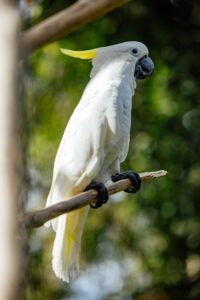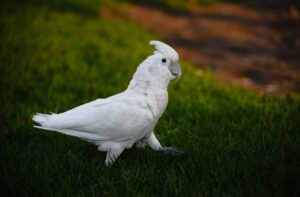White Cockatoo Cost: What You Need To Know About White Cockatoo Prices and Care

White Cockatoo
The Enchanting White Cockatoo: Your Feathered Friend Awaits!
Meet the White Cockatoo, a stunning parrot with feathers as bright as your smile! With a personality as vibrant as its plumage, the White Cockatoo has won the hearts of bird enthusiasts and pet lovers everywhere. But before you embark on this delightful journey, allow me, your enthusiastic White Cockatoo expert, to be your guide through the captivating world of White Cockatoos. In this SEO-optimized 1,500-word blog, we’re about to dive into the magic of White Cockatoos. We’ll unravel the price factors, unveil essential facts, explore top-notch care, decode common health issues, and serve up a recipe for a well-balanced White Cockatoo diet.
The Price of a White Cockatoo
Here is a table of different types of cockatoos and their average cost, size, appearance of a cockatoo:
Type of Cockatoo |
Price Range |
Size |
Appearance |
|---|---|---|---|
Umbrella Cockatoo |
$1,000 – $2,500 |
Large (18-20 inches) |
White plumage, with a crest that can be raised and lowered |
Moluccan Cockatoo |
$1,500 – $3,500 |
Large (20-22 inches) |
Bright salmon-pink feathers with a white crest |
Goffin’s Cockatoo |
$800 – $1,500 |
Small to Medium (12-13 inches) |
White plumage, compact size with a playful demeanor |
Citron Crested Cockatoo |
$1,000 – $2,500 |
Medium (12-14 inches) |
Yellow plumage with an orange crest |
Rose-Breasted Cockatoo |
$1,200 – $2,800 |
Medium (13-15 inches) |
Pink plumage with a white and pink crest |
Picture this: a majestic White Cockatoo perched on your shoulder, sharing your life with grace and charm. But, what’s the price of this avian companion? Well, it’s a bit like a rainbow—colorful and varied! The cost depends on several factors:
Species: White Cockatoos are part of the enchanting Cockatoo family, with different species in the mix. The price tag can differ based on the specific species. Umbrella Cockatoos and Moluccan Cockatoos, known for their charming personalities, may be on the higher end.
Age: Just like a fine wine, the age of your feathered friend can influence the price. Young, hand-raised White Cockatoos may come with a higher price tag compared to their older counterparts.
Coloration: While these parrots are mostly snowy white, some flaunt unique plumage variations and mutations, adding a dash of exclusivity to their charm.
Breeder or Retailer: The source matters. Purchasing directly from a dedicated breeder may be a budget-friendly choice compared to buying from a pet store.
Health and Documentation: Birds with impeccable health records and proper documentation may come at a premium, reflecting their quality and authenticity.
Location: Prices can dance to a regional tune. In areas where White Cockatoos are in high demand, you might find the costs slightly elevated.
So, whether you’re looking for an affordable feathery friend or an exclusive avian companion, a White Cockatoo can be your radiant partner. As you embark on this journey, make sure to do your homework and meet your potential pet in person to ensure they’re healthy and ethically raised. White Cockatoo prices can range from a few hundred to several thousand dollars, and every dollar is a testament to the joy they’ll bring into your life.
Important Facts to Know Before Welcoming a White Cockatoo Home
A White Cockatoo is not just a pet; it’s a lifelong friend with feathers. Here are some key facts to cherish before inviting one into your life:
Lifespan: White Cockatoos are your forever buddies. They have the potential to light up your life for several decades, so be prepared for a lifelong journey.
Social Creatures: These parrots are social butterflies! They crave interaction and mental stimulation. Neglecting their social needs might lead to blues in their beautiful world.
Loudness: Get ready for a feathery fanfare! White Cockatoos are not the silent types. Their powerful, melodious calls can echo through your home, and it’s music to your ears.
Feather Plucking: Like humans, stress and boredom can lead to some feathered fidgeting. To maintain their fabulous plumage, offer mental and physical stimulation.
Diet: It’s a delightful blend of fruits, vegetables, high-quality pellets, and a sprinkling of nuts. A feast that keeps your White Cockatoo in high spirits!
Cage Size: Your home is their kingdom. Provide a spacious cage with room to fly, explore, and play. Their wings deserve to spread wide.
Training: Just like any friend, a bit of guidance goes a long way. Proper training ensures you both understand each other better.
So, as you welcome a White Cockatoo into your life, cherish these essential facts. This enchanting parrot isn’t just a pet; it’s a lifelong companion ready to paint your days with feathers of joy.

White Cockatoo
1. Lifespan: White Cockatoos are known for their longevity. They can live for several decades, so be prepared for a lifelong companion.
-
Social Creatures: White Cockatoos are highly social birds that require a great deal of interaction and mental stimulation. Neglecting their social needs can lead to behavioral issues.
-
Loudness: White Cockatoos are not quiet birds. They have a powerful, piercing call that can be disruptive, especially in close living quarters.
-
Feather Plucking: Stress or boredom can lead to feather plucking, a common behavioral issue in White Cockatoos. Providing mental and physical stimulation is crucial.
-
Diet: A balanced diet is essential. White Cockatoos need a variety of fresh fruits, vegetables, high-quality pellets, and occasional nuts.
-
Cage Size: White Cockatoos are large birds that require spacious cages with plenty of room to move, play, and stretch their wings.
-
Training: Proper training is necessary to prevent behavioral problems and to establish a bond with your White Cockatoo.
Proper Care for Your White Cockatoo
Caring for a White Cockatoo is a rewarding but challenging endeavor. Here are some essential care tips:
-
Cage and Environment: Provide a spacious cage with toys, perches, and mental stimulation. Ensure a safe and engaging environment for your bird.
-
Diet: Offer a balanced diet of fresh fruits, vegetables, high-quality pellets, and a minimal amount of seeds and nuts. Fresh water should always be available.
-
Social Interaction: White Cockatoos thrive on social interaction. Spend time with your bird daily, engage in play, and provide mental challenges.
-
Mental Stimulation: These intelligent birds need mental stimulation to prevent boredom and destructive behaviors. Puzzle toys and foraging opportunities are great for mental exercise.
-
Regular Health Checks: Schedule regular check-ups with an avian veterinarian to ensure your White Cockatoo’s health.
Common Health Issues with White Cockatoos
White Cockatoos can be susceptible to several health issues, including:
-
Psittacine Beak and Feather Disease (PBFD): A viral disease that affects feathers and the beak, leading to feather loss and beak deformities.
-
Respiratory Infections: White Cockatoos are prone to respiratory issues if kept in a drafty or cold environment.
-
Feather Plucking: As mentioned earlier, stress or boredom can lead to feather plucking.
-
Obesity: Overfeeding and a diet lacking variety can result in obesity, which can lead to other health problems.
What to Feed Your White Cockatoo for a Balanced Diet
A balanced diet is essential to your White Cockatoo’s health. Here’s a general guideline for their dietary needs:
**Fruits:** Think of a rainbow of fresh fruits. Offer them a variety that includes apples, pears, and juicy oranges. But here’s a friendly reminder: remove any seeds or pits as they can be a bit toxic for your feathery friend.
**Vegetables:** It’s like a veggie paradise for your White Cockatoo. Carrots, crunchy broccoli, and leafy greens like kale and spinach are on the menu. You can either finely chop them or serve them as whole pieces.
**Nuts:** A little nutty treat is always in season! Nuts like almonds and walnuts are their favorites, but remember, it’s all about moderation. Remove those shells and present them as an occasional treat for added delight.
**Seeds:** Seeds, like sunflower seeds, add a pinch of diversity to their diet. Keep them as a part of their balanced meal plan, but remember, they’re high in fat, so a little goes a long way.
**Water:** The freshest water is their constant companion. Always ensure that their water bowl is clean and refreshed daily. It’s their sip of happiness.
**Supplements:** It’s always a good idea to have an expert’s opinion. Consult an avian veterinarian to decide if your White Cockatoo needs any extra supplements to stay in tip-top shape.
**Toxic Foods:** Here’s a little word of caution, like the icing on a cake. Be aware of foods that are a no-no for birds—avocados, chocolate, caffeine, and alcohol. Keep these treats far, far away from your beloved White Cockatoo.
Owning a White Cockatoo is like having a perpetual source of joy, right by your side! The price you pay for their companionship may vary, but their love knows no bounds. With their long lifespan and unique care requirements, they truly are distinctive companions. Before you welcome a White Cockatoo into your world, make sure you’re well-prepared to provide all the love, care, and attention these remarkable birds deserve. By understanding their needs and offering them proper care, you’re setting the stage for a rich and fulfilling relationship with your White Cockatoo, a friendship that’ll last for many years to come. Happy chirping!
Free Reports
- Cockatiel Sounds: What Type of Sounds Do Cockatiels Make?
- Cane Corso Lab Mix: What You Need To Know Before Adopting Your New Cane Corso Lab Mix
- Belgian Malinois Grooming: How to Properly Care For Your Belgian Malinois
- Hamster Vomiting: What You Need To Do When Your Hamster is Vomiting
- Manchester Terrier Price: What You Should Before Adopting Your Manchester Terrier
- Boerboel Life Span: How Long Do Boerboel Dogs Usually Live?
- Canaan Dog Price: Everything You Should Know About Canaan Dogs Before Adopting
- Do Cane Corso Shed: How Much Cane Corsos Shed and How to Prevent Shedding
- Cane Corso German Shepherd Mix: Everything They Don’t Tell You About This Unique Mix
- Cane Corso Doberman Mix: Check Before You Buy! What They Don’t Tell You About Cane Corso Doberman Mixes
- Brindle Cane Corso: What You Need to Know Before Adopting
- Cockatiel Eye Problems: What to Do When Your Cockatiel Has an Eye Infection
- Top 25 Sun Conure Names: How to Name a Sun Conure, Care Tips and Tricks
- Friesian Horse Price: Everything You Need to Know Before You Buy a Friesian Horse
- Friesian Colors: The Uniqueness of Every Friesian Horse Color, Price and Care Tips